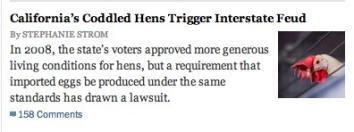The people who comment on New York Times articles are, as a rule, among the calmer, less excitable commenters on the Internet. But today many of them are in a huff about what they see as a cruel headline: “California’s Coddled Hens Trigger Interstate Feud.”
The accompanying article, by Stephanie Strom, is about Missouri’s lawsuit to block California’s requirement that all eggs sold in the West Coast state be produced by chickens with enough room to spread their wings. Commenters argue, correctly, that describing such treatment as “coddling” is hyperbole. (The common alternative, battery cages so small that hens can’t even stand up in them, are widely regarded as inhumane.) “These hens are not coddled,” points out Karin, from Michigan. “They are still in cages all their lives.” Nick, from New York, makes a more pointed argument: “‘Coddled’ hens? Since when it [sic] giving a living animal enough room to freely move about her cage coddling? This is basic decency ….” The word “coddled” appears 23 times, and counting, in the discussion section on the article.
By comparison, it appears in the article itself zero times—not even in the headline, which is different on the article page than it is on the New York Times homepage. (At Slate, we refer to the hyperlinked headlines on the homepage as “promo headlines,” and they’re often different from the headlines that appear on article pages.) Strom is the victim—or, you might argue, beneficiary—of an overzealous homepage editor, who, in attempting to sum up her article in a pithy way (and perhaps make a pun about coddled eggs), missed the point slightly.
We at Slate are no strangers to commenters accusing us of writing misleading promo headlines to get people to click on articles. But, as is the case here, such headlines tend to distract from the content of the article in question. Strom opens her story with tongue planted firmly in cheek:
Hens in California are living the good life. Many can now lay their eggs in oversize enclosures roomy enough to stand up, lie down—even extend their wings fully without touching another bird.
Anyone who doesn’t perceive the sarcasm in this paragraph needs to have his moral compass examined. Of course, the question of whether sarcasm belongs in a reported news story in the paper of record is up for debate. When delivered in writing rather than in speech, sarcasm has a tendency to be misunderstood, by readers and headline writers alike.
